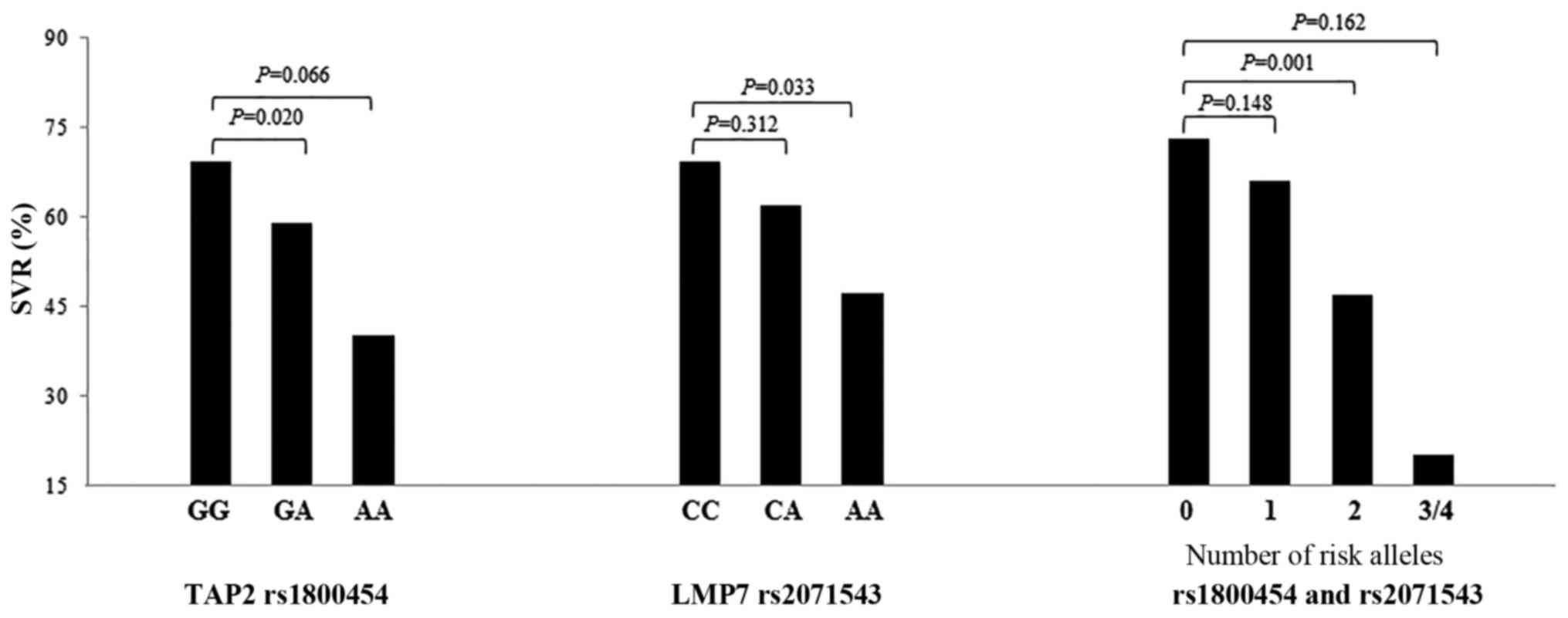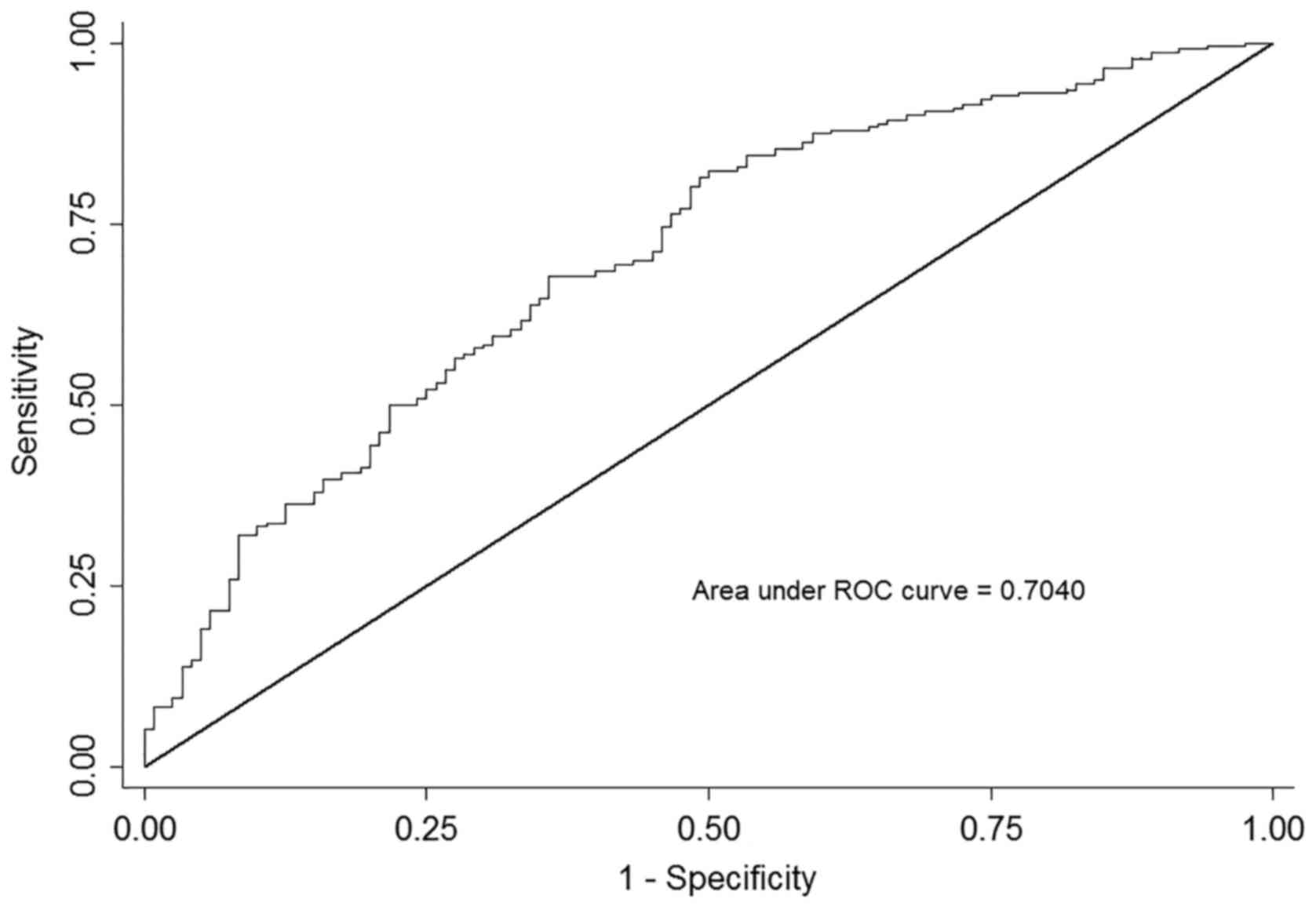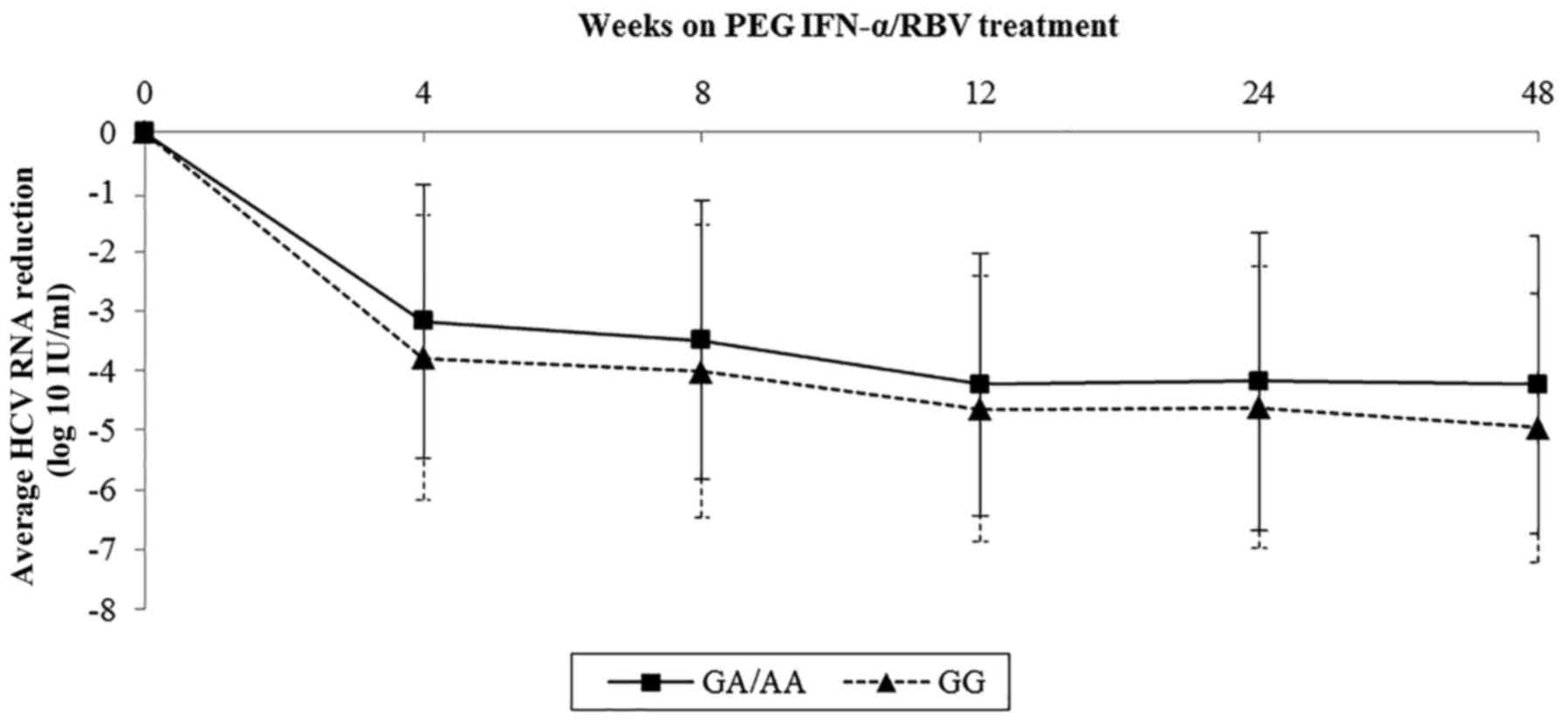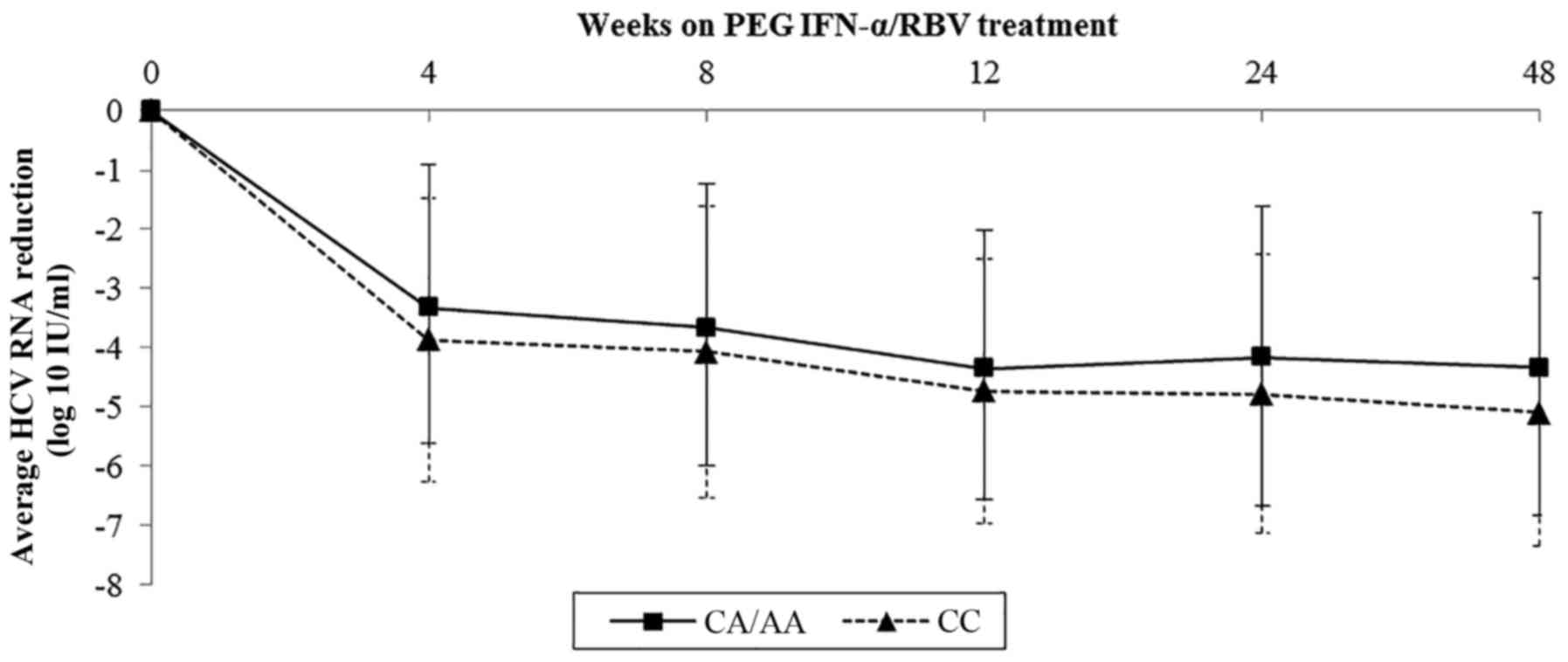|
1
|
Chen SR, Wang AQ, Lin LG, Qiu HC, Wang YT
and Wang Y: In vitro study on anti-hepatitis C virus activity of
Spatholobus suberectus Dunn. Molecules. 21:E13672016. View Article : Google Scholar : PubMed/NCBI
|
|
2
|
Cui Y and Jia J: Update on epidemiology of
hepatitis B and C in China. J Gastroenterol Hepatol. 28(Suppl 1):
7–10. 2013. View Article : Google Scholar : PubMed/NCBI
|
|
3
|
Cai L, Gao C, Tang S, Wang J, Xue X, Yue
M, Deng X, Su J, Peng Z, Lu Y, et al: Sex-specific association of
estrogen receptor 2 polymorphisms with hepatitis C virus infection
outcomes in a high-risk Chinese Han population. Infect Genet Evol.
28:118–124. 2014. View Article : Google Scholar : PubMed/NCBI
|
|
4
|
Bandiera S, Billie Bian C, Hoshida Y,
Baumert TF and Zeisel MB: Chronic hepatitis C virus infection and
pathogenesis of hepatocellular carcinoma. Curr Opin Virol.
20:99–105. 2016. View Article : Google Scholar : PubMed/NCBI
|
|
5
|
Matsuura K and Tanaka Y: Natural history
of hepatitis C virus infection. Nihon Rinsho. 73:195–200. 2015.In
Japanese. PubMed/NCBI
|
|
6
|
Falade-Nwulia O, Suarez-Cuervo C, Nelson
DR, Fried MW, Segal JB and Sulkowski MS: Oral direct-acting agent
therapy for hepatitis C virus infection: A systematic review. Ann
Intern Med. 166:637–648. 2017. View
Article : Google Scholar : PubMed/NCBI
|
|
7
|
Fateh A, Aghasadeghi MR, Keyvani H,
Mollaie HR, Yari S, Hadizade Tasbiti AR, Ghazanfari M and Monavari
SH: High resolution melting curve assay for detecting rs12979860
IL28B polymorphisms involved in response of Iranian patients to
chronic hepatitis C treatment. Asian Pac J Cancer Prev.
16:1873–1880. 2015. View Article : Google Scholar : PubMed/NCBI
|
|
8
|
Ragheb MM, Nemr NA, Kishk RM, Mandour MF,
Abdou MM, Matsuura K, Watanabe T and Tanaka Y: Strong prediction of
virological response to combination therapy by IL28B gene variants
rs12979860 and rs8099917 in chronic hepatitis C genotype 4. Liver
Int. 34:890–895. 2014. View Article : Google Scholar
|
|
9
|
Aziz H, Raza A, Ali K, Khattak JZ, Irfan J
and Gill ML: Polymorphism of the IL28B gene (rs8099917, rs12979860)
and virological response of Pakistani hepatitis C virus genotype 3
patients to pegylated interferon therapy. Int J Infect Dis.
30:91–97. 2015. View Article : Google Scholar
|
|
10
|
Garcia RF, Moreira S, de Araújo Ramos AL,
Ferreira LE, de Mattos AA, Tovo CV, Nader LA, Ramos JA, Rondinelli
E, de Jesus Dominici A, et al: Interleukin 28B-related
polymorphisms: A pathway for understanding hepatitis C virus
infection? World J Gastroenterol. 19:7399–7404. 2013. View Article : Google Scholar : PubMed/NCBI
|
|
11
|
Chowdhry M, Makroo RN, Singh M, Agrawal S,
Kumar M and Thakur Y: Human leucocyte antigen class I and II
alleles associated with anti-hepatitis C virus-positive patients of
North India. Indian J Med Microbiol. 34:299–302. 2016. View Article : Google Scholar : PubMed/NCBI
|
|
12
|
El-Bendary M, Neamatallah M, Esmat G,
Kamel E, Elalfy H, Besheer T, Eldeib D, Eladl AH, El-Setouhy M,
El-Gilany AH, et al: Associations of human leucocyte antigen class
II-DQB1 alleles with hepatitis C virus infection in Egyptian
population: A multicentre family-based study. J Viral Hepat.
23:961–970. 2016. View Article : Google Scholar : PubMed/NCBI
|
|
13
|
Huang J, Huang K, Xu R, Wang M, Liao Q,
Xiong H, Li C, Tang X, Shan Z, Zhang M, et al: The associations of
HLA-A*02:01 and DRB1*11:01 with hepatitis C virus spontaneous
clearance are independent of IL28B in the chinese population. Sci
Rep. 6:314852016. View Article : Google Scholar
|
|
14
|
Waldron PR, Belitskaya-Lévy I, Chary A,
Won J, Winters M, Monto A, Ryan J, Lazzeroni LC and Holodniy M:
Genetic variation in the IL-6 and HLA-DQB1 genes is associated with
spontaneous clearance of hepatitis C virus infection. J Immunol
Res. 2016:65304362016. View Article : Google Scholar : PubMed/NCBI
|
|
15
|
Sedighimehr P, Irani S, Sakhaee F, Vaziri
F, Aghasadeghi M, Sadat SM, Jamnani FR, Fateh A and Siadat SD:
IL28B rs12980275 and HLA rs4273729 genotypes as a powerful
predictor factor for rapid, early, and sustained virologic response
in patients with chronic hepatitis C. Arch Virol. 162:181–189.
2017. View Article : Google Scholar
|
|
16
|
McKiernan SM, Hagan R, Curry M, McDonald
GS, Kelly A, Nolan N, Walsh A, Hegarty J, Lawlor E and Kelleher D:
Distinct MHC class I and II alleles are associated with hepatitis C
viral clearance, originating from a single source. Hepatology.
40:108–114. 2004. View Article : Google Scholar : PubMed/NCBI
|
|
17
|
Huang P, Zhang Y, Lu X, Xu Y, Wang J,
Zhang Y, Yu R and Su J: Association of polymorphisms in HLA antigen
presentation-related genes with the outcomes of HCV infection. PLoS
One. 10:e01235132015. View Article : Google Scholar : PubMed/NCBI
|
|
18
|
Duggal P, Thio CL, Wojcik GL, Goedert JJ,
Mangia A, Latanich R, Kim AY, Lauer GM, Chung RT, Peters MG, et al:
Genome-wide association study of spontaneous resolution of
hepatitis C virus infection: data from multiple cohorts. Ann Intern
Med. 158:235–245. 2013. View Article : Google Scholar : PubMed/NCBI
|
|
19
|
Sugimoto Y, Kuzushita N, Takehara T, Kanto
T, Tatsumi T, Miyagi T, Jinushi M, Ohkawa K, Horimoto M, Kasahara
A, et al: A single nucleotide polymorphism of the low molecular
mass polypeptide 7 gene influences the interferon response in
patients with chronic hepatitis C. J Viral Hepat. 9:377–384. 2002.
View Article : Google Scholar : PubMed/NCBI
|
|
20
|
Cui Q, Zhang Y, Su J, Shi C, Lei N, Ding
K, Li J, Yu R, Wang L and Wang N: The association between the
genetic polymorphisms of LMP2/LMP7 and the outcomes of HCV
infection among drug users. J Biomed Res. 24:374–380. 2010.
View Article : Google Scholar : PubMed/NCBI
|
|
21
|
Huang P, Dong L, Lu X, Zhang Y, Chen H,
Wang J, Zhang Y, Su J and Yu R: Genetic variants in antigen
presentation-related genes influence susceptibility to hepatitis C
virus and viral clearance: A case control study. BMC Infect Dis.
14:7162014. View Article : Google Scholar : PubMed/NCBI
|
|
22
|
Ashraf S, Nitschke K, Warshow UM, Brooks
CR, Kim AY, Lauer GM, Hydes TJ, Cramp ME, Alexander G, Little AM,
et al: Synergism of tapasin and human leukocyte antigens in
resolving hepatitis C virus infection. Hepatology. 58:881–889.
2013. View Article : Google Scholar : PubMed/NCBI
|
|
23
|
Kuzushita N, Hayashi N, Kanto T, Takehara
T, Tatsumi T, Katayama K, Ohkawa K, Ito A, Kasahara A, Moribe T, et
al: Involvement of transporter associated with antigen processing 2
(TAP2) gene polymorphisms in hepatitis C virus infection.
Gastroenterology. 116:1149–1154. 1999. View Article : Google Scholar : PubMed/NCBI
|
|
24
|
Airoldi A, Zavaglia C, Silini E, Tinelli
C, Martinetti M, Asti M, Rossini A, Vangeli M, Salvaneschi L and
Pinzello G: Lack of a strong association between HLA class II,
tumour necrosis factor and transporter associated with antigen
processing gene polymorphisms and virological response to
alpha-interferon treatment in patients with chronic hepatitis C.
Eur J Immunogenet. 31:259–265. 2004. View Article : Google Scholar : PubMed/NCBI
|
|
25
|
El Awady MK, Omran MH, Ibrahim MK,
Moustafa AM, Dawood RM, Bader El Din NG, Elsharkawy A, Abdel Aziz
MS, El Shenawy R, El Abd YS, et al: Low Molecular Mass Polypeptide
7 single nucleotide polymorphism is associated with the progression
of liver fibrosis in patients infected with hepatitis C virus
genotype 4. Clin Lab. 62:381–387. 2016. View Article : Google Scholar : PubMed/NCBI
|
|
26
|
Ibrahim MK, Salama H, Abd El Rahman M,
Dawood RM, Bader El Din NG, Salem HF, Abdelrahim ME, Omran D, Omran
MH, El-Wakeel KH, et al: Three gene signature for predicting the
development of hepatocellular carcinoma in chronically infected
hepatitis C virus patients. J Interferon Cytokine Res. 36:698–705.
2016. View Article : Google Scholar : PubMed/NCBI
|
|
27
|
Ibrahim MK, Salama H, Abd El Rahman M,
Dawood RM, Bader El Din NG, Salem HF, Abdelrahim ME, Omran D, Omran
MH, El-Wakeel KH, et al: Three gene signature for predicting the
development of hepatocellular carcinoma in chronically infected
hepatitis C virus patients. J Interferon Cytokine Res. 36:698–705.
2016. View Article : Google Scholar : PubMed/NCBI
|
|
28
|
El Raziky M, Fathalah WF, Zakaria Z,
Eldeen HG, Abul-Fotouh A, Salama A, Awad A, Esmat G and Mabrouk M:
Predictors of virological response in 3,235 chronic HCV Egyptian
patients treated with peginterferon alpha-2a compared with
peginterferon alpha-2b using statistical methods and data mining
techniques. J Interferon Cytokine Res. 36:338–346. 2016. View Article : Google Scholar : PubMed/NCBI
|


















